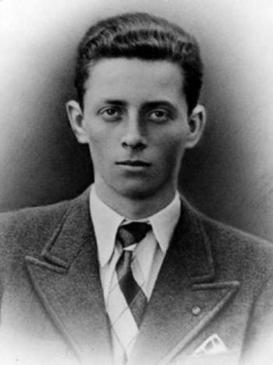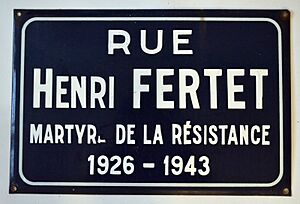Henri Fertet facts for kids
Quick facts for kids
Henri Fertet
|
|
|---|---|
 |
|
| Born |
Henri Claude Fertet
27 October 1926 Seloncourt, Doubs, France
|
| Died | 26 September 1943 (aged 16) Citadel of Besançon, France
|
| Cause of death | German firing squad |
| Burial place | Saint-Ferjeux Cemetery |
| Other names | Émile (nom de guerre) |
| Occupation | Resistance fighter |
| Known for | Farewell letter to his parents |
| Awards |
|
Henri Claude Fertet (born October 27, 1926 – died September 26, 1943) was a brave French schoolboy. He became a resistance fighter during World War II. German forces, called the Wehrmacht, executed him. After his death, he received many national awards. He is famous for a letter he wrote to his parents. This letter was written on the morning he was executed. Henri Fertet is now a symbol of the French Resistance.
Contents
Henri's Early Life
Henri Fertet was born in Seloncourt, Doubs, France. His birthday was October 27, 1926. Both of his parents were primary school teachers. He had a younger brother named Pierre. Henri first went to school in Seloncourt. In 1937, his family moved to Velotte in Besançon. There, Henri attended the Lycée Victor-Hugo de Besançon. He was a determined and intelligent boy. He loved history and archaeology.
Joining the French Resistance
During the summer holidays of 1942, World War II was happening. Henri joined a Resistance group in Larnod, near Besançon. This group was led by Marcel Simon, a 22-year-old farmer. In February 1943, Henri's group joined a larger one. This new group was called the Francs-Tireurs et Partisans (FTP). They were known as Groupe Guy Mocquet. Henri was the youngest member, at just 16 years old.
Brave Actions Against the Occupation
The Groupe Guy Mocquet carried out many secret operations. Between November 1942 and July 1943, they did thirty-one known missions. Henri Fertet took part in three of these. On April 16, 1943, he joined a night attack. They targeted an explosives depot at Fort Montfaucon. On May 7, they destroyed a tall electricity pylon. This pylon was near Châteaufarine.
On June 12, Henri and Marcel Reddet attacked a German customs officer. They wanted to steal his weapon, uniform, and papers. Henri shot the officer, who was badly wounded. But a motorcyclist arrived unexpectedly. This meant Henri and Reddet could not get the documents.
Capture and Trial
The Groupe Guy Mocquet was then actively hunted by the Germans. Several members were arrested in June. In the early morning of July 2–3, Henri Fertet was arrested at his home. He was taken to the Feldkommandantur, a German military court. Then he was sent to Butte Prison in Doubs. He was held alone and faced harsh treatment.
On September 15, twenty-three prisoners went to trial. They were from three Resistance groups. The trial lasted four days. On September 18, seventeen of them were sentenced to death. Marcel Simon and Marcel Reddet were among them. Henri Fertet was the youngest person sentenced to death. He was only 16 years old. Under German law, people under 18 usually could not be sentenced to death. But the court said Henri's case was special.
Lawyers tried to appeal the sentences. Many important people asked for mercy. These included Henry Soum, the local leader, and the Archbishop of Besançon. The sentence of one man, André Montavon, was changed to prison time.
Execution and Burial
On Sunday, September 26, the sixteen condemned men learned their appeals failed. They were given paper to write last letters. They were taken to the Citadel of Besançon. Between 7:36 and 8:25 AM, they were shot in groups of four. The German officer in charge said they all refused blindfolds. He reported they died bravely, shouting "Vive la France!" (Long live France!).
Eight of the sixteen men, including Henri Fertet, were buried. They were laid to rest in Saint-Ferjeux Cemetery, Besançon. Local people bravely covered their graves with flowers. This was against German orders. After the war, Henri's body was moved and cremated. His ashes were scattered with his father's in Sermoyer, Ain.
Henri's Farewell Letter
Henri Fertet's original farewell letter is now lost. But copies were made and shared secretly. On December 9, 1943, a French journalist named Maurice Schumann read it on BBC radio. On June 5, 2019, French president Emmanuel Macron read parts of it aloud. This was during a ceremony in Portsmouth, England.
Here is an English translation of his famous letter:
My dear parents,
My letter will cause you great pain, but I have seen you so full of courage that I do not doubt that you will want to preserve it, if only for love of me.
You cannot know how I have suffered morally in my cell, how I have suffered from seeing you no more, from feeling only from afar your tender solicitude, during these eighty-seven days of imprisonment, I needed your love more than your parcels, and often asked you to forgive me for the wrongs I did to you, all the wrongs I did to you. You cannot doubt that I love you today, because before I loved you perhaps by routine, but now I understand everything you did for me. I think I have arrived at genuine filial love, true filial love. Perhaps, after the war, a comrade will speak for me, of that love which I communicated to him; I hope he will not fail in this henceforth sacred mission.
Thank everyone who knew me, especially my relatives and friends, tell them all of my confidence in eternal France. Embrace most strongly my grandparents, my uncles, my aunts and cousins, Henriette. Tell M. le Curé that I have been thinking in particular of him and his. I thank him for the great honour he has done me, an honour of which, I believe, I have shown myself worthy. I salute also as I fall my school comrades. In this regard, Hennemay owes me a packet of cigarettes, Jacquin, my book on prehistoric man. Return the Count of Monte-Christo to Emeurgeon, 3, chemin Français, behind the station. Give Maurice Andrey de La Maltournée, 40 grams of tobacco which I borrowed from him.
I leave my little library to Pierre, my schoolbooks to my dear Papa, my collections to my dear little Maman, but let her be wary of the prehistoric axe and the Gaulish scabbard.
I die for my country, I want a free France and a happy people, not a proud France first nation of the world, but a hardworking, industrious and honest France.
That the French be happy, there's the whole point. In life, one must know how to find and keep happiness.
As for me, do not worry, I will keep my courage and my good humour to the end and I will sing Sambre et Meuse, because it was you, my dear sweet Maman, who taught it to me.
With Pierre, be severe and tender. Check his work and force him to work. Do not accept negligence. He must be worthy of me. Of the "three little blacks", only one remains. He must succeed.
The soldiers are coming for me. I cannot delay. My handwriting may be shaky, but that is because I only have a stub of a pencil. I have no fear of death, my conscience is completely clear.
Papa, I beg you, I pray, reflect that if I die, it's for my good. What death could be more honorable for me? I die voluntarily for my country. We will meet again soon all four, soon to heaven. What is a hundred years? Maman remember: "And these avengers will have new defenders Who, after their death, will have successors."
Farewell, death calls me, I will refuse a blindfold, I will not be bound. I embrace you all. It is hard when one must die.
A thousand kisses. Long live France.
One condemned to death at the age of 16.
H. Fertet.
Forgive my spelling mistakes, not time to reread.
Sender: Monsieur Henri Fertet, to Heaven, close to God.
Posthumous Recognition
After France was freed, Henri Fertet received many honors. He was named Chevalier de la Légion d'honneur and Compagnon de la Libération. In 1947, General de Gaulle personally gave the Compagnon de la Libération award to Henri's father. Henri also received the Croix de Guerre 1939–1945. Other awards included the Croix du combattant volontaire de la Résistance and the Médaille de la Résistance française. He was also given the rank of aspirant (like an officer candidate) in the French Forces of the Interior.
Several places are named in his memory. These include Rue Henri Fertet in Besançon, a street. There is also Collège Henri Fertet in Sancey, a middle school. Lycée des Métiers Henri Fertet in Gray is a technical college. A tram route in Besançon is also named after him.
Henri's parents were against the Church's influence. But Henri himself was a very religious Catholic. Many members of his Resistance group were also Catholic. It is interesting that he became a hero for the French Republic.
Images for kids
 | DeHart Hubbard |
 | Wilma Rudolph |
 | Jesse Owens |
 | Jackie Joyner-Kersee |
 | Major Taylor |





